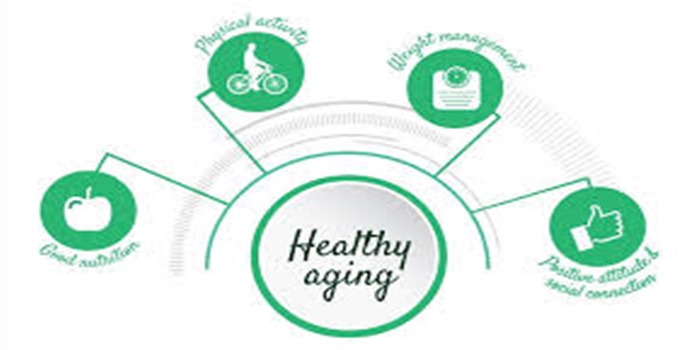In this article, we discussed the meaning of nutritional control of aging, the tips, the effects, the factors, we also talked about the importance.
Definition
Nutritional control of aging refers to the role of diet in the aging process, and how diet can impact health and longevity:
Diet and health
A well-balanced diet can help improve health, reduce the risk of disease, and increase health span. The WHO estimates that eliminating risk factors like poor diet, lack of exercise, and smoking could reduce the risk of type 2 diabetes, stroke, and CVD by 80%.
Caloric restriction
Caloric restriction can increase lifespan in many species, but the implications for humans are less clear. Some studies have shown that caloric restriction in young and middle-aged adults can reduce cardiometabolic risk factors.
Nutrient absorption
As people age, their bodies absorb fewer important nutrients, such as vitamin B12, vitamin D, and calcium.
Other nutritional considerations
As people age, they should reduce their intake of foods high in sugar, salt, and saturated or solid fats. They should also increase their intake of calcium, fiber, iron, protein, and vitamins A, B12, C, D, and Folacin.
Other nutritional interventions
Other nutritional interventions that may help with aging include time-restricted feeding, intermittent fasting, and fasting mimicking diets.
A healthy diet can help you stay healthy as you age. Here are some tips for nutritional control of aging:
Eat nutrient-dense foods: Choose foods that are high in nutrients and low in calories, like fruits, vegetables, whole grains, lean meats, seafood, and low-fat dairy.
Avoid empty calories: Limit foods that are high in calories but low in nutrients, like chips, candy, baked goods, soda, and alcohol.
Reduce saturated and trans fats: These facts are often found in animal products and processed foods.
Stay hydrated: Drink enough liquids to avoid dehydration, especially if you take certain medicines or have lost your sense of thirst.
Exercise: Physical activity can help you feel hungrier if you’ve started losing your appetite.
Consider the Mediterranean diet: This eating plan is supported by many medical experts for healthy aging
Nutritional control can have several effects on aging, including:
Anemia
Iron-poor diets and chronic diseases can lead to anemia in older adults. Other factors include ulcers, decreased stomach acid, and an inability to absorb vitamin B12.
Weight loss
Older people can lose weight involuntarily due to poor dietary intake. This can be caused by diseases or psychological factors that create a negative energy balance.
Gastrointestinal changes
After age 80, the small intestine’s motility decreases, which can negatively affect nutrient absorption. Older adults may also experience a relaxation of the muscles in the esophagus.
Less lean body mass
Aging can lead to a reduction in lean body mass and an increase in fat mass. This can facilitate the onset of systemic inflammation and insulin resistance.
Vitamin B12
Studies estimate that 10–30% of people over age 50 have a reduced ability to absorb vitamin B12 from their diet. Vitamin B12 is essential for making red blood cells and maintaining healthy brain function.
Lowered energy intake
Physiological changes associated with age can contribute to lowered energy intake. These changes include:
Slower gastric emptying
Altered hormonal responses
Decreased basal metabolic rate
Altered taste and smell
Here are some ways that nutrition is important for aging:
Disease prevention
A well-balanced diet can help prevent diseases like osteoporosis, heart disease, type 2 diabetes, and some cancers.
Energy and weight control
Good nutrition can help you maintain your energy levels and control your weight.
Independence
Healthy eating can help you stay independent longer.
Chronic conditions
Poor nutrition and aging can lead to chronic conditions like heart disease, diabetes, and high blood pressure.
Frailty prevention
Good nutrition can help prevent frailty, which can lead to loss of muscle mass, declining cognitive function, and other health issues.
Vitamin B12
Older adults should eat foods rich in vitamin B12, like meat, poultry, fish, eggs, and dairy, to avoid deficiency. Low levels of vitamin B12 have been linked to memory loss and hearing loss.
Dietary lipids
High-fat diets are linked to increased mortality and metabolic diseases. However, some specific lipids are beneficial for health.
Aging can lead to a decline in nutritional status due to a number of factors, including:
Reduced intake of nutrient-dense foods
Lower intestinal absorption
Impaired nutrient metabolism
Digestion and absorption issues
Oral health issues, like inability to chew or mouth dryness
Decreased appetite
Conclusion
Healthy eating and good nutrition are important throughout our lives. As seniors, we tend to eat less and be less energetic. Supporting our daily nutritional needs and maintaining a healthy weight helps older adults stay active and independent. It also offsets some of the physical effects of aging.


